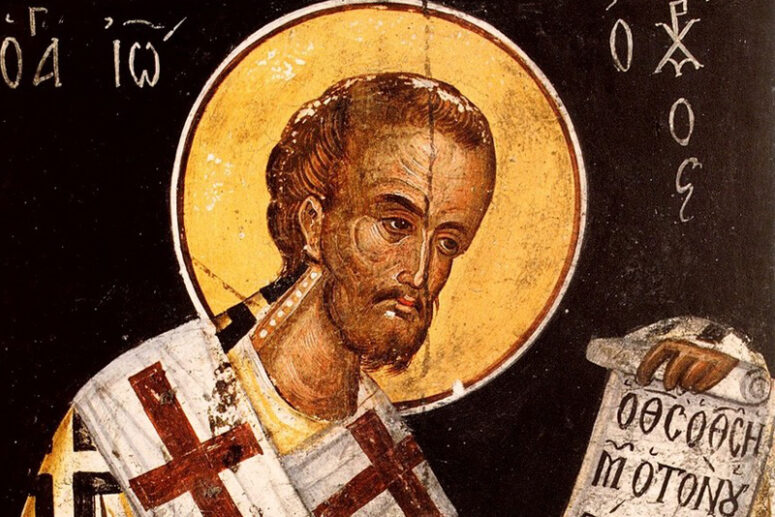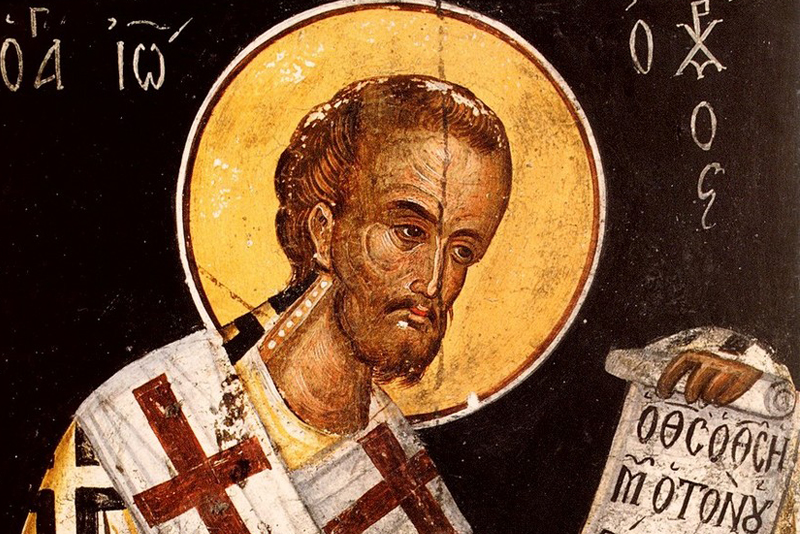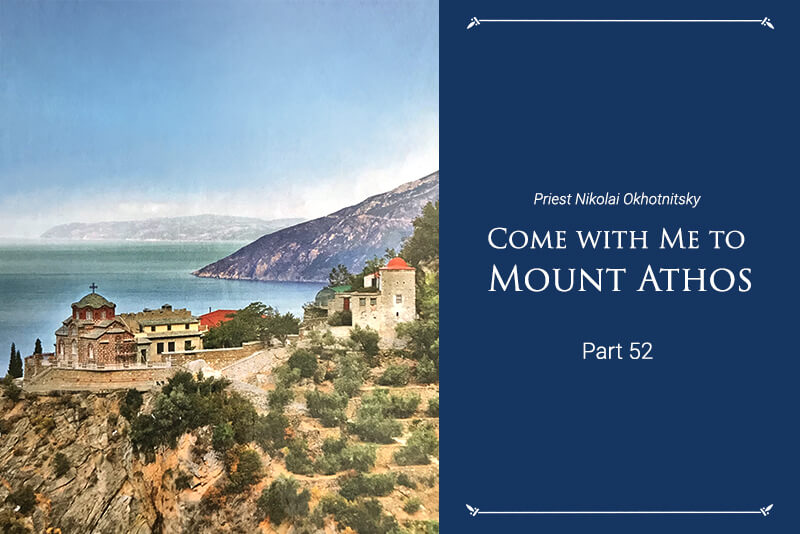
Would a Christian be justified in confronting a blasphemer with physical force, if all other means of calling him to reason fail? This question has been the subject of a lively Internet debate for several years. Advocates of a forceful response cite fragments from the writings of Saint John Chrysostom, in which he advises readers to “sanctify their hand with a blow”, “strike his mouth” and “smite him on the face”, and resort to other undiplomatic ways of dealing with blasphemers. Some Christians take comfort in these words, and see them almost as a direct sanction to assault their opponent on the slightest suspicion of blasphemy. Others feel uncomfortable and unnerved at how much this advice from a highly revered saint is inconsistent with their moral beliefs.
The arguments of the advocates of violence are simple and straightforward: as long as John Chrysostom says so, a Christian is justified, and even obliged to treat blasphemers harshly.
The position of the other camp is more nuanced. To them, this advice contradicts the whole body of scriptural texts and the Orthodox tradition. Admittedly, the call for violence is found only once in all of John Chrysostom’s writings – otherwise we would have seen more quotes from the saint on the same subject.
Yet there is little doubt that John Chrysostom really said this. In his Homily on Statues, he writes: “But since our discourse has now turned to the subject of blasphemy, I desire to ask one favour of you all, in return for this my address, and speaking with you; which is, that you will correct on my behalf the blasphemers of this city. And should you hear anyone in the public thoroughfare, or in the midst of the forum, blaspheming God; go up to him and rebuke him; and should it be necessary to inflict blows, spare not to do so. Smite him on the face; strike his mouth; sanctify your hand with the blow.”
This raises an important ethical question: to what extent should today’s Christians take this advice as a call to action?
To answer this question, we should first find out what John Chrysostom himself had in mind when he was saying these harsh words. When he was asking to inflict blows on blasphemers, who exactly did he have in mind?
The revolt
In the year 387, a revolt broke out in Antioch, the largest city of Asia Minor. It was triggered by the decision of Emperor Theodosius to raise taxes on its residents. The peasants, artisans and traders were already cracking under the financial strain of the emperor’s taxes, and it was getting worse each year. Yet the emperor imposed an extraordinary tax on top of all the others on account of his birthday. The tax was so high that the whole city fell into despair when it was announced. In the eyes of the people, the new tax was inhumane, and anger began to build up.
Sporadic unrest quickly escalated into a full-scale rebellion. Furious crowds began to deface the images of the emperor and members of his family. The rioters hurled rocks at the emperor’s portraits and broke the wooden planks on which they were painted. They destroyed the Emperor’s multiple statues that were scattered across the city. They used ropes to pull the statues down.
They dragged the downed statues around the city shouting insults and profanities. They broke them up and drowned the pieces in the river. Crowds of people came together to bring down the massive statue of the emperor on horseback.
The response from the emperor was prompt and harsh. Under the laws of the empire, denigration of an image of the emperor carried the same penalty as insulting the emperor in person. The emperor’s wrath was vicious and deadly. Many people suffered. Some were dispossessed, others imprisoned and many were executed. Tens of thousands of Antioch residents had to flee their homes, and fell easy prey to the robbers who were abundant in the city’s environs. Tears, hunger and constant anticipation of further reprisals was the lot of the survivors.
It was in this tragic context that John Chrysostom delivered his prominent homilies on statues. Only the first homily was delivered before the revolt, as tension was mounting, but had not grown yet into a full-scale rebellion. He dedicated his second homily to the gruesome aftermath of the unrest. In these trying times for all Antiochians, he gave as many as 21 homilies.
Blasphemers
The call to use all possible means, including physical violence to pacify the agitators is found in John Chrysostom’s first homily. As is clear from the text of the homilies, it was these activists that he was referring to as blasphemers. In this way, he was trying to pacify the dispossessed and the impoverished, while recognising that the immediate cause of the unrest were the ruinous taxes.
Many Antiochians were convinced that poverty was unworthy of God’s love and the real God was different from the way the Church was portraying Him. John Chrysostom saw these ideas taking root and spreading. He wrote: “there are many who deceive the simpler class by saying that these things are unworthy of the Providence of God.” Some of the tempted and deceived were blaming God for their misfortunes. John Chrysostom wrote of those people: “The blasphemer is an ass; unable to bear the burden of his anger, he has fallen. Come forward and raise him up, both by words and by deeds; and both by meekness and by vehemence; let the medicine be various.”
To John Chrysostom, the blasphemers were the city’s poor who were murmuring against God. This is obvious from the paragraph that precedes the fragment on violence against blasphemers, which, regrettably, is almost never quoted. “Have you lost money? If you have been thankful, you have gained your soul; and obtained greater wealth; having acquired a greater measure of the favour of God. But if you blaspheme, you have, besides this, lost your own safety; and hast not regained possession of your wealth; yea and your soul, which you had, you have sacrificed! “But since our discourse has now turned to the subject of blasphemy, I desire to ask one favour of you all, in return for this my address, and speaking with you; which is, that you will correct on my behalf the blasphemers of this city. And should you hear anyone in the public thoroughfare, or in the midst of the forum, blaspheming God; go up to him and rebuke him; and should it be necessary to inflict blows, spare not to do so. Smite him on the face; strike his mouth; sanctify your hand with the blow…» To be fully certain as to who Chrysostom considers worthy to be hit why, let us refer to this fragment from his homilies that elaborates on his advice to strike the blasphemer’s mouth: “How many do I hear say, Let there be no poverty! Therefore let us stop the mouths of those who murmur at such things. For it is blasphemy to utter such complaints.
The physician
In the stressful environment of an imminent rebellion over excessive taxes, John Chrysostom was asking his flock do everything possible to prevent it. Before taking his monastic vows, Chrysostom had received a brilliant education and worked for several years as a lawyer. He knew the laws of the empire too well to predict the dire consequences of the rebellion.
The backbreaking taxes were devastating the city. Yet the wrath of the emperor for rising up against him would bring an even greater disaster. John Chrysostom spared no effort to admonish his fellow countrymen against the revolt. He called its instigators blasphemers and condemned them for their denial of the providence of God. He asked his flock to call their naive and gullible brethren to reason, and use every means to do so, including violence if nothing else works.
Let us also remember that these tragic events took place in the first year of his priesthood. Never again did Chrysostom repeat his calls for violence after the rebellion, although there were probably as many of them in his time as there are now. If fact, his view of physical violence is best expressed in the following maxim: “The teacher is the physician of souls. But the physician does not strike, but heals and restores him that has stricken him.” He repeated this idea on many occasions over two decades of his pastoral and episcopal ministry.
The choice
What can we learn from this discussion? Christian theology is grounded in the principle of Consensus Patrum, or unanimous agreement of the holy fathers on matters of faith and worship. Its main tenet was formulated by Saint Vincent of Lerins in the fifth century after Christ: “That only is to be accounted indubitable, certain, established, which either all, or the more part, have supported and confirmed manifestly, frequently, persistently, in one and the same sense, forming, as it were, a consentient council of doctors, all receiving, holding, handing on the same doctrine. But whatsoever a teacher holds, other than all, or contrary to all, be he holy and learned, be he a bishop, be he a Confessor, be he a martyr, let that be regarded as a private fancy of his own, and be separated from the authority of common, public, general persuasion.”
Consistent with this rule, John Chrysostom’s calls for violent opposition to blasphemers are exceptional even to his own writings. They were made in an extraordinary situation of great danger to many people. But there is definitely no consensus among the Holy Fathers in favour of attacking blasphemers physically. Today, a Christian who ‘sanctifies his hand with the blow” may not expect his actions to be justified by the authority of John Chrysostom or his teachings. He will be solely responsible for his behaviour and the philosophical and ethical choices in which it is grounded.
Translated by The Catalogue of Good Deeds
Source: https://foma.ru/osvyati-ruku-udarom.html





We are in extraordinary times.
This is an excellent article which leads us to call to mind a crucial detail that seems to be ignored: context. The events surrounding all kinds of comments must always be considered, or else we will reach conclusions that are simply incorrect.
For example, before I converted to Orthodoxy I was a Lutheran. One of my charges against the Roman Catholic Church (and by extension this argument is made against our own Orthodox Catholic Church) is that Our Lord instructs us to “call no man father” in Matt. 23:9. To many Protestants, this “proves” that any Christian church which refers to its pastors/priests as “Father” is in error. But when one considers the fact that Jesus was chastising the religious authorities for their failure to lead God’s people, and that for this reason they are unworthy of such a title, Our Lord’s words make more sense. Consider, too, that Abraham and Paul are both referred to as fathers, either in a literal or spiritual sense.
Likewise, when St. John Chrysostom calls for violence, it seems unusual on the surface. Frankly, that’s because it is. But when understood in context, we see that his call was actually instruction to maintain peace, not to set off an aggressive and likely bloody revolution.
Dear Joshua, thank you for your comment and for sharing some facts from your own life!
The fact of the matter is we live in a pluralistic world and if we are fortunate enough to live in a democratic country our beliefs and convictions can not and must not be imposed on others who do not hold our beliefs. Yes, it would be nice if everyone voluntarily believed as we Orthodox do, but that is not going yo happen. Our religious belief govern our own lives and can not and should not be forced on others as the Muslims do. So just remember we would be no better then the Muslims if we force our beliefs on those outside our faith.